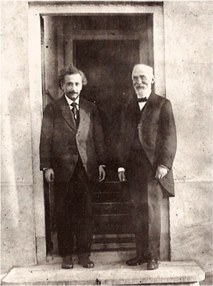Personalities
Texts by Dr. Antonio Moreno González
On the occasion of the seventieth birthday of Romain Rolland (1866-1944) Einstein wrote:
"I have only seen you once with these mortal eyes. That was at the time of the outbreak of the European catastrophe and you were still marked by that recent impression. Solitary, observing, suffering the unspeakable, oppressed by an awareness of being unable to create or release light, you were never able to achieve complete consolation by influencing improvement through your high art and your word; you wanted to help those human creatures who languished in the wretchedness they themselves had created. The rough masses are motivated by sordid passions, to which they are entirely subjugated, as are the states they personify... You, venerable master, have not remained silent, but rather you have struggled and suffered... At this time, so humiliating for us Europeans, we have seen that the athletics of the spirit are no protection against the meanness of the soul or barbarous sentiments. I believe that noble and humane feelings prosper no better in the universities and academies than in the workplaces of unknown and unheard villagers. Today you are greeted by those who see you as an example. It is the group of solitary men, immune to the epidemic of hatred, who aspire to abolish war, as the first objective on the road to improving the moral health of mankind..."
Romain Rolland had helped mould Einstein's first pacifist leanings. Rolland recorded his own impression of their only meeting:
"Einstein is still a young man, not very tall, with a long, wide face, and a great mane of crispy, frizzled and very black hair, sprinkled with grey and rising high from a lofty brow. His nose is fleshy and prominent, his mouth small, his lips full, his cheeks plump, his chin rounded. He wears a small cropped moustache."
Among scientists, he admired Max Planck (1858-1947) whom he considered to be a true revolutionary, and he venerated Hendrik A. Lorentz (1853-1928), who shared the 1902 Nobel prize with Pieter Zeeman for their "pioneering work on the connection between optical and electromagnetic phenomena". Of all the praise Einstein heaped on Lorentz, this declaration on the centenary of Lorentz's birth, is a defining one:
"At the end of the century, theoretical physicists from all countries considered H. A. Lorentz to be the greatest among their number, and they were right. Physicists of our times are not, generally speaking, fully aware of the decisive role played by H. A. Lorentz in structuring the essential ideas of theoretical physics. The reason for this curious fact is that Lorentz's basic ideas have come to be so familiar that it is difficult to see how audacious they were and to what extent they have simplified the fundaments of physics." "
Another influential character in Einstein's life and attitude was Mahatma Gandhi (1869-1948). On Gandhi's seventieth birthday, Einstein wrote:
"A leader of his people, unsupported by any outward authority: a politician whose success rests not upon craft nor the mastery of technical devices, but simply on the convincing power of his personality, a victorious fighter who has always scorned the use of force, a man of wisdom and humility, armed with resolve and inflexible consistency, who has devoted all his strength to the uplifting of his people and the betterment of their lot, a man who has confronted the brutality of Europe with the dignity of the simple human being, and thus at all times risen superior."

With Hendrik Antoon Lorentz (1853 - 1928)
